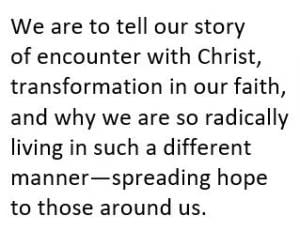An Emmanuel Apologetic
 What if we moved our apologetic away from reasoned arguments toward telling the story of the Gospel by the way we work for the common good? What if we so dramatically laid down our lives for the sake of those around us that they couldn’t help but notice and ask, “What is up with you?”
What if we moved our apologetic away from reasoned arguments toward telling the story of the Gospel by the way we work for the common good? What if we so dramatically laid down our lives for the sake of those around us that they couldn’t help but notice and ask, “What is up with you?”
Way back in 2005, when I was a heavy blogger at Vanguard Church, I wrote a series of posts on how we need to reframe “apologetics” in the 21st Century. It got a lot of traction in the Emerging Church blogosphere (back when the “Emerging Church” was a hopeful new way to present Jesus Christ to a skeptical postmodern culture). I still think in terms of this Emmanuel Apologetic, and I think it is time to revisit this.
In an increasingly postmodern culture, where there is skepticism of our capability to rely solely on “reason” to prove the truth of Christ, it seems to me that we need to emphasize what I called an “Emmanuel Apologetic,” or a “God with us apologetic.”
Evidence that Demands a Verdict
In the modern era, evangelical apologetics relied a lot on “reason,” with resources like the best-selling book, Evidence that Demands a Verdict. The word “apologetic” is from the Greek word apologia, translated either as “answer” or “defense” in English translations. As the English Standard Version renders 1 Peter 3:15, “Always being prepared to make a defense to anyone who asks you for a reason for the hope that is in you.”
Unfortunately, modernism stripped apologia from its context in Peter’s letter, inferring that the passage means “to make a rational defense based on logic for all things Christian.” The ESV tells us to give a “defense” since people will ask us for the “reason” for the hope that is within us. That sounds so very brain-centric! As a result, there was a whole genre of Christian books called “apologetics,” or “ready defense” books, written by philosophy of religion specialists who offer “reasonable arguments defending the faith.”
I own a lot of these books! I have enjoyed reading these because they help me when I have doubts about my own faith. And I recommend them to young adults when they’re struggling to make sense of the Christian faith.
But there are some Christians who gobble up these books hoping to arm themselves with Christian rational arguments in order to counter the arguments that non-Christians may have against the faith. They want to be ready, in case they have to defend why they believe certain doctrines, like the resurrection, miracles, or even the existence of God.
Why Do You Live in Such Hope?
But look again at the context of 1 Peter 3:15. The “answer” or “defense” that one is told to be prepared to give is to those who ask us Christians why we live in such hope.
 What this presupposes is that Christians are living in such a radical and conspicuous way in the midst of those who do not yet know Christ that they are noticing.
What this presupposes is that Christians are living in such a radical and conspicuous way in the midst of those who do not yet know Christ that they are noticing.
If you legitimately work as to the Lord, serving not only your boss but your co-workers, figuring out ways to make your clients/customers and suppliers flourish, and seeking to offer a product or service that brings about the common good, you will stick out in the crowd. If work as though your job is more than a paycheck but the means to live out your calling, as the expression of your “vocation,” then people will start to ask questions.
The people around you will either wonder why you work in such a hopeful way or they will be suspicious that you are just play-acting. Very often it will be the latter. Many will mock a Christian as a do-gooder, assuming that nobody would do the things you do without some devious agenda (they will “speak maliciously against your good behavior in Christ” v. 16), but we must follow Christ as our Lord (v. 15a), and willingly suffer for the good done for people as Christ did (3:18, 4:1).
Don’t Try to “Be a Witness”
If you believe that the Gospel is not only the means for getting people out of Hell and into Heaven, but is the means by which God is making the world the way it is meant to be, you are no longer doing good work merely as a “witness.” You believe that you are participating in God’s mission in the world, to restore flourishing (what the Bible calls “shalom”) through the kingdom of God.
There’s a big difference between “I work hard and ethically in order to be a witness” and “I end up being a witness because I work hard and ethically.” The former does good work for an agenda other than doing good work. Not only will people most likely see through that, it isn’t really sustainable. The latter does good work because the work matters – it is the means to serve others. The work that brings flourishing to others provides deep motivation. And God is glorified because our work is authentic, not just a means for something else.
When everything you do – at work, in your neighborhood, in your community, in your family, in your church, in your social circles, etc. – is genuinely seeking to bring blessing to others as the very expression of God’s kingdom gospel, then people will take notice. You are on your way to that conversation where you can explain the story behind it.
Live for Others and Tell Them the Story of Why You Do So
Peter says to be ready to say why you have this hopeful lifestyle. In a skeptical age, people will perhaps be confrontational with us. So this defense is not a belligerent one, it is done with “gentleness and respect.”
We are told here to tell our story.
Peter says, “Always being prepared to give an answer to anyone who asks you for a reason for the hope that is in you.” That word “reason” is not so much a “reasoned argument” but an “account” (the Greek word is logos, a “word,” or “a narrative description”) of why we have hope.
People aren’t looking for an argument; they want to hear your story.
Each of us is to look for opportunities are to tell our story of encounter with Christ, transformation in our faith, and why we are so radically living in such a different manner—spreading hope to those around us.
While I believe that some people, if they have cognitive roadblocks to faith, may still need to have things explained to them in rational ways, the main biblical apologetic has always been an Emmanuel Apologetic—an apologetic that displays God to people by living among people as a people of hope.
Photo by Christin Hume on Unsplash













